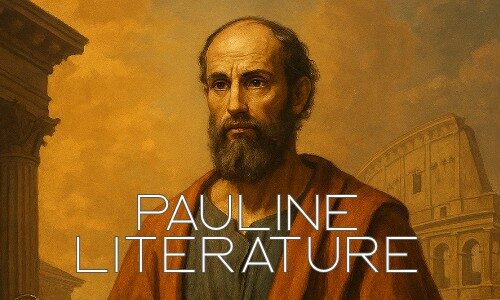A deep dive into the life, theology, and letters of the Apostle Paul. It examines his major themes, such as justification by faith, the new creation, and the role of the church, within their historical context.
Pauline Literature
Level: Master’s
Course Length: 10 weeks (approx. 120–150 hours total if following full module path)
Delivery Mode: Competency-based, self-paced with required final exam
Course Overview
This course is a deep dive into the life, theology, and letters of the Apostle Paul. It explores his historical background, missionary journeys, and the theological depth of his writings. Students will analyze Paul’s key themes—justification by faith, the new creation, the role of the Spirit, and the life of the church—while paying close attention to the cultural and historical contexts of the Greco-Roman world.
The course is competency-based:
-
Students may complete all modules to prepare for the final exam, or
-
If they already have the knowledge, they may skip directly to the final competency exam.
Competency is demonstrated by interpreting Paul’s letters and articulating his theology in historical and theological context.
Learning Outcomes
By the end of this course, students will be able to:
-
Summarize Paul’s life, conversion, and missionary activity.
-
Explain the historical context of Paul’s letters.
-
Analyze the theology of Paul with respect to justification, the Spirit, eschatology, and ecclesiology.
-
Interpret key passages from Paul’s letters in their literary and theological contexts.
-
Integrate Paul’s teaching into broader biblical and theological frameworks.
Weekly Breakdown (10 Weeks)
Week 1: Introduction to Paul and His World (8–10 hours)
-
Paul’s biography: Pharisee, persecutor, apostle to the Gentiles.
-
Historical and cultural context: Judaism, Greco-Roman world, early church.
-
Competency: Describe Paul’s life and historical setting.
Week 2: Paul’s Missionary Journeys & Letter Writing (12–14 hours)
-
Acts’ account of Paul’s missionary journeys.
-
Ancient letter-writing practices.
-
Overview of disputed vs. undisputed letters.
-
Competency: Explain Paul’s missionary method and letter style.
Week 3: Early Letters – 1 & 2 Thessalonians (10–12 hours)
-
Themes: encouragement in persecution, eschatological hope.
-
Competency: Interpret Paul’s eschatological teaching in Thessalonians.
Week 4: Major Letter – Galatians (12–14 hours)
-
Justification by faith apart from works of the law.
-
The Spirit and Christian freedom.
-
Competency: Explain Paul’s argument in Galatians.
Week 5: Major Letters – 1 & 2 Corinthians (12–14 hours)
-
Themes: unity in the church, spiritual gifts, resurrection.
-
Paul’s theology of the cross.
-
Competency: Analyze Paul’s theology of the church and resurrection.
Week 6: Major Letter – Romans (Part 1) (12–14 hours)
-
Paul’s magnum opus: sin, justification, and salvation.
-
Themes of law, grace, and righteousness.
-
Competency: Summarize Romans 1–8.
Week 7: Romans (Part 2) (12–14 hours)
-
Israel and God’s plan (Romans 9–11).
-
Ethical exhortations (Romans 12–16).
-
Competency: Explain the theological scope of Romans.
Week 8: Prison Epistles (Ephesians, Philippians, Colossians, Philemon) (10–12 hours)
-
Themes: Christ as head of the church, joy in suffering, new creation.
-
Competency: Compare theological emphases in the prison letters.
Week 9: Pastoral Epistles (1 & 2 Timothy, Titus) (10–12 hours)
-
Church order, leadership, and sound teaching.
-
Competency: Identify Paul’s guidance for church life and leadership.
Week 10: Integration & Competency Exam Prep (10–12 hours)
-
Key themes: justification, Spirit, church, new creation, eschatology.
-
Case studies from Paul’s letters.
-
Final Competency Exam (required).
Assessment
-
Competency Exam (100%): Students must demonstrate mastery by interpreting selected passages, outlining Paul’s theology, and integrating historical context.
-
Optional formative assessments: reading guides, discussion prompts, and practice translation/analysis (not required).
Curriculum
- 10 Sections
- 18 Lessons
- Lifetime
- Week 1: Introduction to Paul and His World (8–10 hours)Paul’s biography: Pharisee, persecutor, apostle to the Gentiles. Historical and cultural context: Judaism, Greco-Roman world, early church.3
- Week 2: Paul’s Missionary Journeys & LetterActs’ account of Paul’s missionary journeys. Ancient letter-writing practices. Overview of disputed vs. undisputed letters.4
- Week 3: Early Letters – 1 & 2 Thessalonians (10–12 hours)Themes: encouragement in persecution, eschatological hope.2
- Week 4: Major Letter – Galatians (12–14 hours)Justification by faith apart from works of the law. The Spirit and Christian freedom.3
- Week 5: Major Letters – 1 & 2 Corinthians (12–14 hours)Themes: unity in the church, spiritual gifts, resurrection. Paul’s theology of the cross.3
- Week 6: Major Letter – Romans (Part 1) (12–14 hours)Paul’s magnum opus: sin, justification, and salvation. Themes of law, grace, and righteousness.3
- Week 7: Romans (Part 2) (12–14 hours)Israel and God’s plan (Romans 9–11). Ethical exhortations (Romans 12–16).3
- Week 8: Prison Epistles (Ephesians, Philippians, Colossians, Philemon) (10–12 hours)Themes: Christ as head of the church, joy in suffering, new creation.2
- Week 9: Pastoral Epistles (1 & 2 Timothy, Titus) (10–12 hours)Church order, leadership, and sound teaching.2
- Week 10: Integration & Competency Exam Prep (10–12 hours)Key themes: justification, Spirit, church, new creation, eschatology. Case studies from Paul’s letters.3
Instructor

